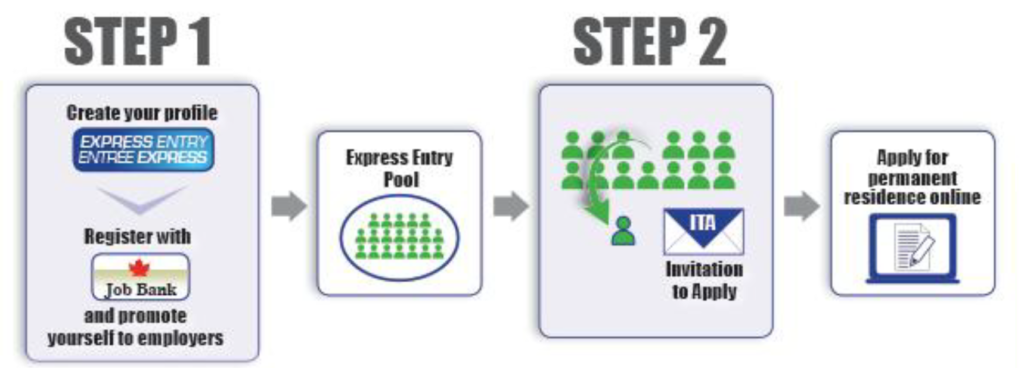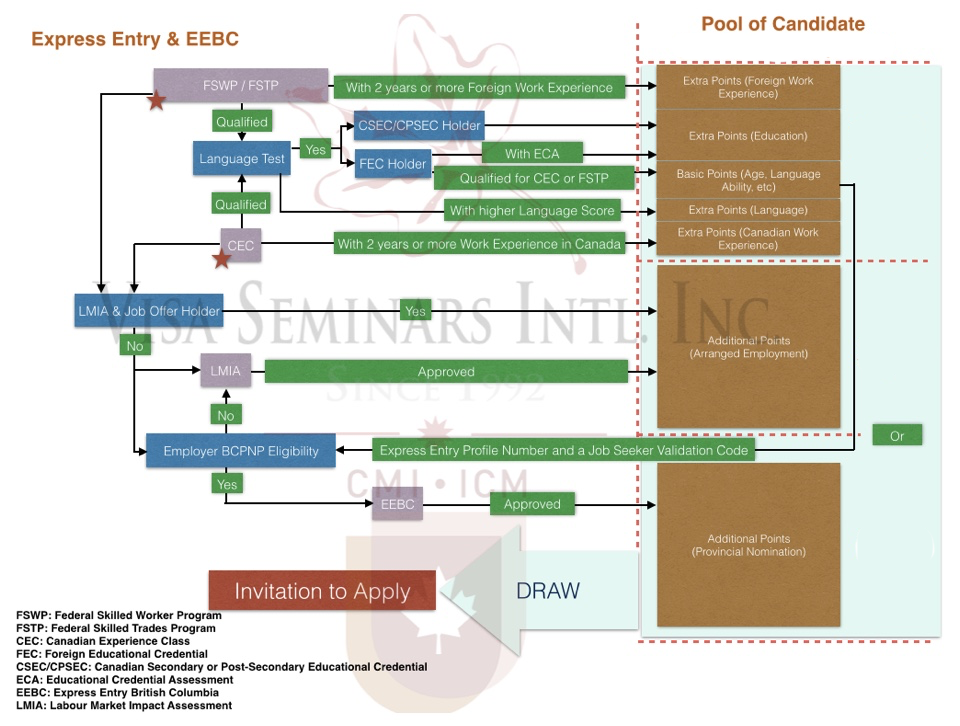
Immigrate and settle in Canada permanently through Express Entry
Express Entry manages applications for three economic immigration programs:
- Federal Skilled Worker Program
- Federal Skilled Trades Program
- Canadian Experience Class
Provinces and territories can also recruit candidates from the Express Entry pool through the Provincial Nominee Program (PNP) to meet local labour market needs.

Express Entry has the following 3 categories:
Canadian Experience Class
- for skilled workers with eligible Canadian work experience
- work experience must have been gained in the 3 years before you apply
Federal Skilled Worker Program
- for skilled workers with foreign or Canadian work experience
- must meet criteria for education and other factors
Federal Skilled Trades Program
- for skilled workers who are qualified in a skilled trade
- must have a valid job offer or a certificate of qualification
Canadian Experience Class
The Canadian Experience Class is for skilled workers who have Canadian work experience and want to become permanent residents.
Minimum requirements:
1-Canadian skilled work experience
You must have at least 1 year of skilled work experience in Canada (or an equal amount of part-time work experience) in the 3 years before you apply
have gained your work experience by working in Canada while authorized to work under temporary resident status
show that you performed:
a-The actions in the lead statement of the occupational description in the National Occupational Classification (NOC)
b-Most of the main duties listed
Skilled work experience means that you’ve worked in 1 or more of these NOC training, education, experience and responsibilities (TEER) categories
TEER 0,TEER 1,TEER 2,TEER 3
c-Your skilled work experience must be paid work, including paid wages or earned commission. volunteer work or unpaid internships are not eligible.
You’re not eligible for the Canadian Experience Class if:
- you’re a refugee claimant in Canada
- you’re working without authorization
- your work experience was gained without temporary resident status in Canada
Self-employment and work experience gained while you were a full-time student (even if you were on a co-op work term) doesn’t count toward the minimum requirements for this program.
Exemption for physicians
Temporary public policy for foreign national physicians who were invited to apply for permanent residence through Express Entry on or after April 25, 2023, and submitted an application with work experience in providing publicly funded medical services in Canada (such as fee-for-service work), this self-employed Canadian work experience is counted as eligible CEC work experiences. When you create your Express Entry profile, to make it possible for your work experience to count as Canadian work experience, do not check the “Self-employed work” checkbox under Work experience in Canada.
2-Language Requirements
- Your language tests are valid for 2 years after the date of the test result
- must be valid on the day you apply for permanent residence
- You must meet the minimum score required:
There is no education requirement for the Canadian Experience Class.
Federal Skilled Worker Program
The Federal Skilled Worker Program is for skilled workers who have work experience and want to become permanent residents. People who has no Canadian experience can apply through this program if you have high enough scores.
To be eligible, you must meet all the minimum requirements for:
- skilled work experience
- language ability
- education
- age
- education
- work experience
- whether you have a valid job offer
- English or French language skills
- adaptability (how well you’re likely to settle in Canada)
- The current pass mark is 67 points.
Skilled work experience
Skilled work experience means that you’ve worked in 1 of these National Occupational Classification(NOC) TEER categories:
- TEER 0
- TEER 1
- TEER 2
- TEER 3
You must show that while working in your primary occupation, you performed:
- the actions in the lead statement of the occupational description in the NOC
- most of the main duties listed
Your “primary occupation” means the job you:
- have experience in
- want to base your immigration application on, if you’re invited to apply
Your primary occupation may not be your most recent work experience. If you don’t have the minimum work experience in the primary NOC you choose, you won’t be found eligible.
Your skilled work experience must
- be in the same type of job (have the same NOC) as your primary occupation
- have been obtained within the last 10 years, in Canada or abroad
- be paid work (you must have been paid wages or earned commission—volunteer work or unpaid internships don’t count)
- be at least 1 year of continuous work or 1,560 hours total (30 hours per week)
- You can meet this in a few different ways:
- full time at 1 job: 30 hours/week for 12 months = 1 year full time (1,560 hours)
- equal amount in part-time work: for example 15 hours/week for 24 months = 1 year full time (1,560 hours)
- You can work as many part-time jobs as you need to meet this requirement.
- full time at more than 1 job: 30 hours/week for 12 months at more than 1 job = 1 year full time (1,560 hours)
- You can meet this in a few different ways:
Part-time work experience
Your skilled work experience must be paid work including paid wages or earned commission. We don’t count volunteer work or unpaid internships.
For part-time work, you can work more or less than 15 hours/week as long as it adds up to 1,560 hours. You can work more than 1 part-time job to get the hours you need to apply.
We don’t count any hours you work above 30 hours/week.
Student work experience
Work experience gained while you were studying may count towards your minimum requirements if the work:
- was paid by wages or commissions
- was continuous (no gaps in employment), and
- meets all the other requirements of the Program
Language ability
You must
- take approved language tests in English or French for
- writing
- reading
- listening
- speaking
- meet the minimum score required in all 4 abilities
- enter the test results in your Express Entry profile
Your language tests are valid for 2 years after the date of the test result. They must be valid on the day you apply for permanent residence.
Education
If you went to school in Canada, you must have a certificate, diploma or degree from a Canadian
- secondary institution (high school) or
- post-secondary institution
If you have foreign education, you must have
- a completed educational credential and
- an Educational Credential Assessment for immigration purposes that
- is from a designated organization and
- shows your education is equal to a completed certificate, diploma or degree from a Canadian secondary institution (high school) or post-secondary institution
The Federal Skilled Trades Program
The Federal Skilled Trades Program is for skilled workers who want to become permanent residents based on being qualified in a skilled trade.
You must meet all the minimum requirements for your:
- skilled trades work experience
- job offer or certificate of qualification
- language ability
Skilled trades work experience
You must
- have at least 2 years of full-time work experience (or an equal amount of part-time work experience) in a skilled trade within the 5 years before you apply
- meet the job requirements for that skilled trade as set out in the National Occupational Classification (NOC)
- show that you performed:
the actions in the lead statement of the occupational description in the NOC
most of the main duties listed - Your work experience only counts if you were qualified to practice that trade where you got your work experience. If you were qualified in one country, but worked in another country with different rules for practicing your trade, you must have also met the requirements to practice there independently.
Skilled trades NOC groups:
Your work experience must be in one of the following NOC groups:
Major Group 72, technical trades and transportation officers and controllers
excluding Sub-Major Group 726, transportation officers and controllers
Major Group 73, general trades
Major Group 82, supervisors in natural resources, agriculture and related production
Major Group 83, occupations in natural resources and related production
Major Group 92, processing, manufacturing and utilities supervisors, and utilities operators and controllers
Major Group 93, central control and process operators and aircraft assembly assemblers and inspectors, excluding Sub-Major Group 932, aircraft assemblers and aircraft assembly inspectors
Minor Group 6320, cooks, butchers and bakers
Unit Group 62200, chefs
Job offer or certificate of qualification:
You must have a
- valid job offer of full-time employment for a total period of at least 1 year or
- certificate of qualification in your skilled trade issued by a Canadian provincial, territorial or federal authority
Certificate of qualification
A certificate of qualification proves you’re qualified to work in a certain skilled trade in Canada. This means you
- passed a certification exam
- meet all the requirements to practise your trade in the province or territory that issued your certificate
This certificate is issued by
- the provincial or territorial body that governs trades in their province or territory, or
- a federal authority
Depending on which body or authority issues it, this certificate may be called a “certificate of qualification” or a “qualification certificate.”
To get a certificate, the provincial, territorial or federal authority must assess your training, trade experience and skills to decide if you’re eligible to write a certification exam.
Get assessed by the province or territory
Each province and territory has its own
- certificate of qualification requirements
- certification process
You may
- have to go to the province or territory to be assessed for your trade
- need an employer in Canada to give you experience and training
If the province or territory where you plan to live and work doesn’t give certificates of qualification in your trade, you’ll need a valid job offer in your trade to be eligible for this program.
If your trade is federally regulated
If your trade is not regulated by a province or territory, it may be federally regulated (for example, airplane mechanics).
Find out who regulates your trade and how to get assessed through the Canadian Information Centre for International Credentials.
Language ability
You must
- take approved language tests for
- writing
- reading
- listening
- speaking
- meet the minimum score required
- enter the test results in your Express Entry profile
Your language tests
- are valid for 2 years after the date of the test result
- must be valid on the day you apply for permanent residence.
Education
There is no education requirement for the Federal Skilled Trades Program.
If you want to improve your rank in the Express Entry pool, there are 2 ways you can do this.
- If you went to school in Canada, you can get points for a certificate, diploma or degree from a Canadian
- secondary institution (high school) or
- post-secondary institution
- If you have foreign education, you can get points if you have both of these
- a completed educational credential
- an educational credential assessment report for immigration purposes that
- is from a designated organization and
- shows your education is equal to a completed certificate, diploma or degree from a Canadian secondary institution (high school) or post-secondary institution
Proof of funds
You must show that you have enough money for you and your family to settle in Canada, unless you
- are currently able to legally work in Canada and
- have a valid job offer from an employer in Canada

